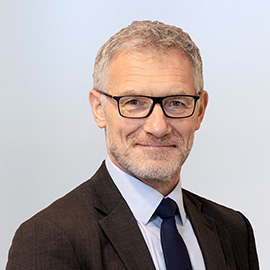Dear Reader,
As a year, 2024 was both exciting and challenging. It was marked by many fascinating research projects but also multiple crises and global uncertainties. A stagnating economy, political changes and budget cuts at national level, coupled with global crises such as ongoing wars in Ukraine and the Middle East, the US election, and the continuing climate crisis - all this formed the framework to our systems and innovation research. These challenges were a very strong incentive for our evidence-based advice for politics and business.
In 2024, we again handled more than 400 projects and were able to produce outstanding studies, get people thinking and enrich decision-making in politics and the economy with new concepts and new evidence. In this annual report, we present a small selection of the research conducted at ISI as examples demonstrating the high quality and thematic diversity of our work.
Once again, we are proud that our researchers’ impact on science was evidenced by a very high rate of excellence in scientific publications. At this point, we would like to mention our anthology Systems and Innovation Research in Transition, which was compiled by an institute-wide team and describes the policy advice history of our innovation and systems research.
Our ties with stakeholders, clients and people from politics, business and society have become even closer. The highlights of 2024 were invitations to the German President, Frank-Walter Steinmeier, and to the Vice-Chancellor and Federal Minister for Economic Affairs and Climate Action, Robert Habeck.
Close contact to politics is important to us. We strengthened these ties and our dialogue with policymakers by opening a representative office in Berlin. We launched this with a stakeholder workshop in October 2024. We plan to hold regular events and discussions to foster the ties and understanding between science and politics.
Our location in Heilbronn has been further strengthened by the steadily growing Joint Innovation Hub (JIH), successful cooperation with clients in the fields of Foresight Technologies & Business Intelligence, Innovation Eco-Systems and Metaverse & Habitats, and funding from the Dieter Schwarz Foundation and regional project partners. The JIH is part of a Fraunhofer initiative intended to strengthen the region as a leading hub for research and innovation and to make a decisive contribution to shaping the future in Europe and the world in the fields of innovation, digitalization, artificial intelligence and sustainable systems.
We are delighted that our employees were appointed to important committees and received high-ranking awards including Prof. Rainer Walz’s invitation to join the ESIR Expert Group and the prestigious innovation award, the 2024 Rudolf Diesel Medal, which was presented to our institute director Prof. Marion Weissenberger-Eibl.
On the international stage, Fraunhofer again organized numerous events last year including the Conference on Science, Technology and Innovation Indicators (STI) in Berlin and the final event marking the conclusion of the green hydrogen project “HYPAT - Global H2 Potential Atlas“, which was funded by the German Federal Ministry of Education and Research BMBF.
How will our systems and innovation research develop in 2025? In the interview with the chair of our board of trustees, Dr. Mirjam Storim (Head of Strategy & Technology Relations at Foundational Technologies at Siemens AG), we take a look at the current state of systems and innovation research.
The incorporation of the Leipzig location into Fraunhofer ISI from January 2025 has widened our research portfolio to include the Departments of Regional Development and Innovation Policy and Knowledge and Technology Transfer. This is a valuable addition to our scientific and practical activities. With Fraunhofer ISI in Leipzig we have another excellent regional anchor in Saxony as well as in Baden-Württemberg.
We would like to take this opportunity to sincerely thank all our clients and project partners for their cooperation. We look forward with confidence to 2025 and the tasks that await us.
We hope you enjoy reading this annual report and find our shared success and developments inspiring.
With kind regards
From the directors of Fraunhofer ISI
Prof. Jakob Edler, and Prof. Marion A. Weissenberger-Eibl





